Lying in Wait Ann Rule's Crime Files Vol.17 Read online
Page 2
Geneva was excited about the contest, but she hadn’t had a chance to talk to Larry about it. She suggested that Jackie come back when her husband was home.
But the stranger with a camera was persistent, and said they should go with her now for a photo shoot.
Geneva was tired. She had given birth to James by caesarean section, and she was still sore. But she was nice to everyone, and she didn’t want to be rude to the lady from the magazine who assured her that baby James was handsome enough to win the contest.
She would get no argument from Geneva on that. She was proud of both her children, and she could understand why her visitor was so charmed by her infant son.
But it was 8 P.M.—getting close to Tracy’s bedtime, and growing colder by the minute. It wasn’t practical to scoop up her two small children and go riding off in a car with someone she barely knew. As nicely as she could, Geneva explained that she would not be going anywhere that night.
Not to be refused, the lady suggested that they all step outside and follow her to her car so she could take their picture. It would take just a moment, she explained, and there was a good chance that James would win the five hundred dollars.
While the photographer was a stranger, she hardly seemed threatening. She was, after all, a mother herself. In fact, her own daughter was with her, and she looked to be close to Tracy’s age.
The woman didn’t wait for an invitation, but brushed by Geneva as she stepped into the house. She quickly picked up the baby and handed him to her daughter, bending to whisper something in the girl’s ear.
Tracy and her mother followed the lady and her daughter outside. If Geneva thought something was amiss, Tracy wasn’t aware of it.
A Chevy Malibu station wagon was backed into the driveway, and they headed toward the car so the photographer could get her camera. She explained that she wanted Geneva and her “adorable” daughter to pose for a picture before she took one of James.
Geneva and Tracy stood side by side, their backs to a tree beside the driveway as they posed for the camera. Then the woman raised her hands. She was holding something and pointing it at them. Tracy figured it was the camera.
“I heard a boom and a bang, and then I saw a flash,” Tracy remembers. “I thought it was the flash on the camera.”
Boom! Bang! Flash!
Geneva slowly slumped against the tree and then slid to the ground.
Confused, Tracy knelt beside her mother and looked into her anguished eyes. “Mama!” she cried. “What’s wrong?”
Geneva gazed into her daughter’s trusting eyes. Tracy was bewildered. She didn’t know why her mama was on the ground or why she was staring at her with such sad eyes.
But there was no time for her mother to explain any of it to her. Geneva was dying; she could sense her life seeping away. She had only one last breath, only one last word to speak. Her voice was weak and gurgling as she whispered, “Run!”
Tracy didn’t hesitate. She bolted into the shadows and was swallowed up by the dark edges of the yard.
“I remember it as if it happened last week,” Tracy recalls some thirty-four years later.
The frozen leaves beneath her feet crackled as she moved toward the fence. It was so dark that she could not see where she was going, but fear and her mother’s last words propelled her forward.
Tracy heard the sound of tires squealing as she scrambled over the fence and dropped into the yard next door where her daddy’s aunt and uncle lived.
Ford and Ruby Tribble were horrified when they opened the door and found little Tracy standing there, covered with her mother’s blood.
The traumatized child looked at them with wild eyes and cried, “Mama! Mama! Help! Help!”
She had no other words to describe what had happened. She was in deep shock, but she would remember the details of that terrible night forever.
* * *
As the Malibu roared away from the Clemonses’ home, seven-year-old Dana Rose wailed in the backseat. She had just witnessed a woman killed, and the boom of the gun blast was as much of a shock to her as it was to the screaming baby in her arms—the lady’s baby!
Dana Rose felt as if she were in a nightmare. Why had her mother shot the nice lady and taken her baby?
Dana Rose’s little sister, Deanna,* was curled up on the seat beside her. She was asleep, but even if she had been awake, she would not have been able to understand what had just happened. Deanna was only four years old.
Harold Lee Schut, her stepfather, was behind the wheel of the Malibu, and he reached into the backseat and smacked Dana Rose across the face, telling her to “quit bawling.” The blow bloodied her nose, and warm blood gushed down her face.
Her sobs diminished to soft sniffles as their car raced through the night.
* * *
The Tribbles rushed to the Clemonses’ yard with Tracy behind them. When they saw Geneva on the ground, Tracy begged her aunt and uncle to help her, crying, “Get Mama up!”
The horror of the situation was just beginning to dawn on the middle-aged couple. Geneva was shot, and the baby was gone. The Tribbles hurried into the Clemonses’ house to phone for help. “They took me inside with them,” remembers Tracy.
Her eyes settled on the big, yellow bag of Funyuns and her mother’s can of Sun Drop soda. “It was sitting there, still cold, but my mama never got to drink it.”
The image of her mother’s untouched soda was burned forever into her memory—a reminder of how quickly things can change.
Just minutes before, Tracy had been cozy on the couch, excited to watch her favorite show with her mother, her baby brother safe beside them. Now, she was standing there numb with shock as the ambulance and police cars arrived with lights whirling.
Geneva Clemons had been shot with a .38-caliber pistol, struck twice, once in the abdomen and once near her shoulder, the force of one bullet dislodging her breast. She was taken away in the ambulance, but there was nothing more anyone could do for her.
The murder was so cruel, it shocked the small Athens police force. What kind of person would execute a mother in front of her child and then steal her newborn? And where was the baby? It hardly seemed likely that this was a kidnapping for ransom. The Clemonses lived in a modest home and were clearly not wealthy.
Investigators didn’t know it yet, but the abductor hadn’t kept the infant for long. Baby James had already been abandoned, left in a ditch by a field in Hartselle, Alabama, twenty-eight miles south of Athens. The baby was all alone, shivering in the cold, his cries unanswered.
Geneva’s husband, Larry Clemons, was at his job at a co-op in Decatur, a few miles away, when his wife was killed. He was on a break when his sister-in-law called him. “She said my wife had been shot and my baby was kidnapped. I dropped the phone,” he remembers.
Geneva was the love of his life, and Larry did not know what he would do without her. They had been so excited about the new baby, and now, both Geneva and the baby were gone. Larry was so shaken, he went into shock and was treated at the hospital.
It was a little before 10 P.M. when Clyde Reeves drove along Reeves Road, toward his Hartselle home. The farmer pulled into his driveway, and his headlights swept his field as he rounded a curve. For a split second, he saw something white caught in the beams of light, and he immediately thought of his cat. She was expecting kittens but had disappeared. Had she had her kittens in the ditch? Clyde was worried about the cat and was anxious to find the kittens. He parked the car and hurried to the house to get a flashlight.
“I think I found the cat,” he told his wife, and he headed through the field toward the ditch. When he got close, the first thing he noticed was two tiny hands—human hands! He rushed back to the house and told his wife to phone the police.
Clyde Reeves had found baby James. The infant was wearing only a onesie and covered with a thin receiving blanket. He was barely alive, and he was rushed to the hospital. Gravely ill from his exposure to the cold, he soon developed double pneumonia
. He had been left outside in near freezing temperatures for close to two hours. If another half hour had passed, the news would have been far more grim. It was a miracle baby James was found before it was too late.
“He had turned black and blue,” Larry Clemons recalls. “My son had to be hospitalized for four weeks.”
Authorities were stymied by the senseless killing. According to little Tracy, the shooter had been a woman with a daughter of her own. Was this a case of a woman unable to bear another child who was so desperate for a baby that she would commit murder? If so, why would she then reject the baby and leave him outside to die?
There was also the possibility that someone was so angry at Larry or Geneva that they attacked the family in an act of revenge. But the Clemonses had no enemies. There was no reason in the world for anyone to want to hurt them.
Larry could no longer live in the house where he had shared such happy times with his wife. The memories were too painful. “I told the landlord that I had to move,” he says. “I couldn’t live in a place where my wife had been killed in the driveway.”
Larry could not bear to look at anything that reminded him of Geneva—and everything did. “I got rid of my car and my truck,” he confesses.
The love of his life had ridden beside him in those vehicles, and every time he got behind the wheel, her absence cut deeper.
He asked his wife’s sister to go through Geneva’s belongings and take what she wanted. It hurt him too much to see her possessions.
Now, it was just Larry and the children. He loved them dearly, and he vowed to be the best father he could to them. He thanked God the kids had two sets of grandparents to nurture them.
But Larry’s grief was so overwhelming that it broke his spirit. He had a mental breakdown. “I was hospitalized for three or four months,” he remembers.
Tracy, too, was anxiety ridden. She was so nervous that she jumped at sudden noises. Worst of all were the nightmares. She could not forget the face of the killer.
Even today, over three decades after the stranger destroyed their lives, Tracy still can’t forget, and she says quietly, “I remember that monster.”
Now the memory makes her sad, but as a child it terrified her. “That monster” came for the little girl in her dreams, and Tracy awoke in a cold sweat.
She felt so helpless when she saw her daddy crying. “I knew there was nothing I could do for him,” she says, “but I did my best to try to make him smile.”
As of this writing, thirty-four years have passed since Geneva was savagely taken from her family, and Larry admits he is still grieving. He married twice more, but those unions didn’t work out. He accepts the fact that he will never again find the kind of love he had with Geneva.
“I miss her still,” he says sadly.
* * *
One month after the Athens shooting, on Wednesday, February 20, 1980, Lori Vaughn,* age fifteen, of Oak Grove, Louisiana, gave birth to a baby girl at University Medical Center in Jackson, Mississippi.
The baby was beautiful, and Lori named her Tina.* Just hours after Tina was born, the new mother noticed a chunky young woman hanging around the maternity ward.
Tired and sore, Lori was getting to know her newborn when she looked up to see the stranger enter her room. Lori wasn’t alarmed. The woman was smiling and friendly, and she told her about her life as she admired the infant.
The visitor confided in the teen that she was depressed because she had recently given birth, but the baby had died. It made her very sad, she said wistfully, because she could not have any more children. She loved being around babies, she added, as she gazed adoringly at the infant.
Half a dozen times that day, the woman visited Lori’s room, once changing Tina’s diaper.
The next morning, around 10:30, the stranger showed up again. By now, Lori was comfortable with her, and she wasn’t worried when the woman picked up Tina and said that she was going to take her to the nursery so that the doctor could check her umbilical cord. She assured Lori that this was part of the procedure, and that the baby could not be released from the hospital until the doctor checked her cord.
Long minutes ticked by, and the woman did not return with little Tina. When Lori asked the nurses about her daughter’s whereabouts, they were alarmed. The baby wasn’t in the nursery, and the doctor hadn’t examined her cord.
Tina had been abducted!
Her teeth chattering with shock, Lori did her best to give police an accurate description of the stranger who had walked away with her new baby. The kidnapper was heavyset, about 160 pounds, and her hair was brown. She wore tennis shoes, jeans, and a red shirt with a blue jacket.
The FBI was called in, and they questioned the staff. One of the hospital employees remembered a woman who matched the description of the kidnapper. She had seen her use the telephone. The FBI checked phone records and were able to determine that the suspect had made a call to a woman named Rita Warner.*
They went to see Rita, and when they asked her about who had phoned her at the time in question, she told them that her daughter had. Mrs. Warner and her daughter, Bonnie Stevens,* hadn’t been close in recent years, but Rita knew where she lived. She gave the FBI agents the address, and they arrested Bonnie at her home in Tallulah, Louisiana.
Baby Tina was returned to her mother at 10 P.M., eleven and a half hours after she had been taken. The doctor pronounced the infant healthy.
Kidnapper Bonnie Stevens was twenty-two years old, the mother of two children, and had been divorced for about a year and a half. She had recently been treated at the Tallulah Mental Health Clinic.
Bonnie wept as FBI agents accompanied her to the Jackson magistrate’s office. She was in serious trouble. Not only did she face charges for kidnapping, she was a suspect in a murder!
It was the second time in four weeks that a stout, dark-haired woman had stolen an infant. While Lori Vaughn hadn’t been harmed when her baby was abducted, there were too many similarities between the Vaughn case and the Clemons case to be ignored.
After facing charges for kidnapping Tina Vaughn, Bonnie was held for questioning in the Alabama case. Athens detectives were excited, hoping this would be the break they needed. They took Geneva’s sister, Kathy, to identify the suspect. Could this be the woman she had seen hanging around the Clemons house on January 21?
But Kathy took one look at Bonnie Stevens and shook her head. This wasn’t the woman she had seen. This was not the woman who killed her sister.
* * *
When the stranger complimented her baby, Cheryl Jones couldn’t help feeling proud. Amanda was adorable, and she didn’t doubt that her eight-week-old infant could win the beautiful baby contest that the woman had told her about.
The woman who introduced herself as Sally was short and squat, with owlish glasses, and she repeatedly remarked how pretty Amanda was.
It was March 6, 1980, and Cheryl, age twenty, was shopping at the PX on the naval station in the Algiers section of New Orleans, Louisiana. Her husband, Dennis, was in the navy. Cheryl missed him when he was on maneuvers, but their baby kept her busy. Amanda Rae Jones was growing so fast, and Cheryl was excited about each new thing she did. She called or wrote letters to her mother, updating her on each little milestone.
Cheryl’s mother, Margaret Pecore, would later tell a reporter how excited her daughter had been when she called her to report that baby Amanda had smiled for the first time.
Cheryl was Margaret’s baby. Margaret and Alfred Pecore had six children—one boy and five girls. Cheryl, born in October 1959, was the youngest. They raised their family in Baldwinsville, New York, where Alfred worked as a machinist, and Margaret helped make ends meet by sewing and taking in ironing.
Margaret was a talented seamstress, and her daughters, too, all learned how to sew at a young age. Cheryl picked up a needle and thread and started stitching pieces of fabric together before she was in kindergarten.
“Cheryl made all her own school clothes,” says Cheryl’s
sister, Kathy Taylor, who was born two years before Cheryl. All the sisters sewed their own clothing, but Cheryl had a special knack for it.
“She made her prom dress,” Kathy remembers. “And later on, I used it for my wedding dress!”
When she was a teen, Cheryl took a piece of pretty fabric and built an entire quilt around it, creating the design as she went. Even Mrs. Pecore was impressed by the lovely quilt her daughter created from nothing. “My mother was fascinated by it,” Kathy says.
The Pecore house was small for a family of eight, and all five girls shared a bedroom. As the two youngest sisters, Kathy and Cheryl were very close.
Their home was in the country, and the sisters considered themselves “farm girls.” They didn’t live on a farm themselves, but they were right next door to a dairy farm. “It was owned by a man named MacDonald. That was really his name!” laughs Kathy, who remembers that they liked to go to MacDonald’s farm for homemade ice cream.
Both Cheryl and Kathy were animal lovers, and they encouraged stray cats and dogs to follow them home. “Sometimes Cheryl would bring home a cat, and she would hide it from my parents for a few days,” Kathy recalls. She would wait for their parents to be in a good mood, and then she would bring out the cat and act as if it had just wandered in. Margaret and Alfred likely saw through the scheme, but they just smiled and let most of the strays stay.
Cheryl had a wickedly silly sense of humor that sometimes got her in trouble with the teachers at school when she disrupted the class. She also liked to make Kathy laugh at inappropriate times.
Though Cheryl was intelligent, she had no plans for college—no lofty aspirations to become a career woman. Even as a young girl, when the other kids talked about what they wanted to be when they grew up, Cheryl had one dream. “She wanted to have a baby,” says Kathy.
Cheryl met her soul mate at school when she was about thirteen. Dennis Jones was a year older than she was, and he fell for her as soon as he met her.
“Before he was old enough to have a real job, he mowed lawns all summer so he could buy her a ring,” Kathy remembers. “His family was mad at him for spending all his money on that ring.”

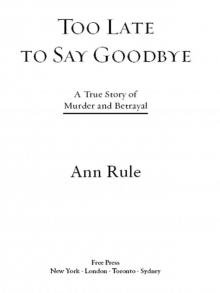 Too Late to Say Goodbye: A True Story of Murder and Betrayal
Too Late to Say Goodbye: A True Story of Murder and Betrayal Green River, Running Red
Green River, Running Red Bitter Harvest
Bitter Harvest Dead by Sunset: Perfect Husband, Perfect Killer?
Dead by Sunset: Perfect Husband, Perfect Killer?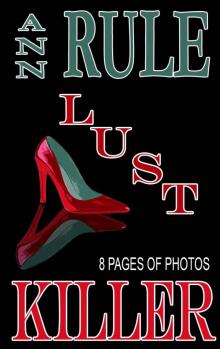 Lust Killer
Lust Killer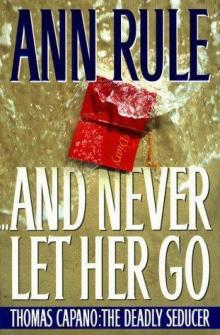 And Never Let Her Go: Thomas Capano: The Deadly Seducer
And Never Let Her Go: Thomas Capano: The Deadly Seducer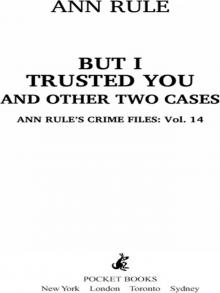 But I Trusted You and Other True Cases
But I Trusted You and Other True Cases Smoke, Mirrors, and Murder and Other True Cases
Smoke, Mirrors, and Murder and Other True Cases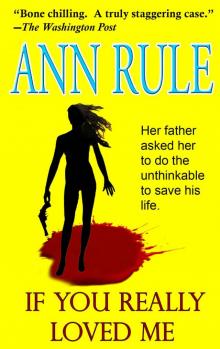 If You Really Loved Me
If You Really Loved Me Kiss Me, Kill Me and Other True Cases
Kiss Me, Kill Me and Other True Cases Fatal Friends, Deadly Neighbors and Other True Cases
Fatal Friends, Deadly Neighbors and Other True Cases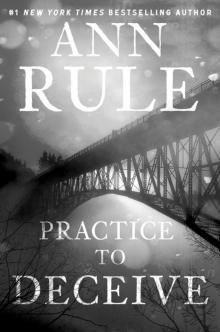 Practice to Deceive
Practice to Deceive Mortal Danger and Other True Cases
Mortal Danger and Other True Cases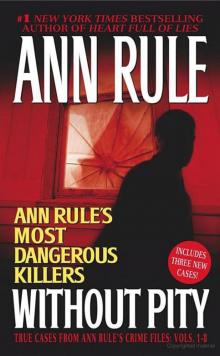 Without Pity: Ann Rule's Most Dangerous Killers
Without Pity: Ann Rule's Most Dangerous Killers Everything She Ever Wanted
Everything She Ever Wanted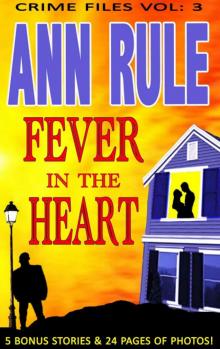 A Fever in the Heart and Other True Cases
A Fever in the Heart and Other True Cases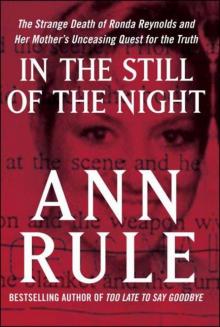 In the Still of the Night
In the Still of the Night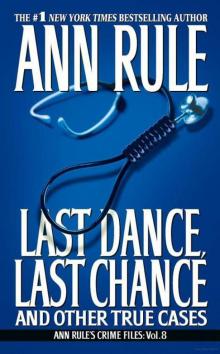 LAST DANCE, LAST CHANCE - and Other True Cases
LAST DANCE, LAST CHANCE - and Other True Cases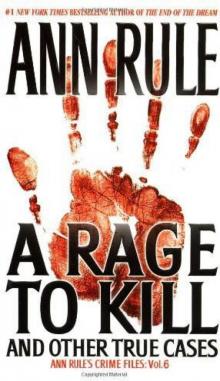 A Rage to Kill
A Rage to Kill The I-5 Killer
The I-5 Killer The Stranger Beside Me
The Stranger Beside Me Everything She Ever Wanted: A True Story of Obsessive Love, Murder, and Betrayal
Everything She Ever Wanted: A True Story of Obsessive Love, Murder, and Betrayal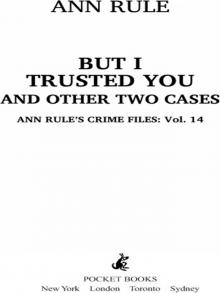 But I Trusted You
But I Trusted You Without Pity
Without Pity Kiss Me, Kill Me
Kiss Me, Kill Me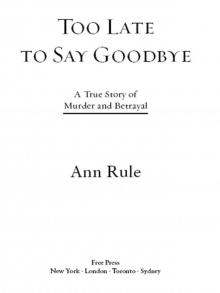 Too Late to Say Goodbye
Too Late to Say Goodbye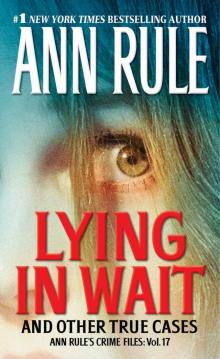 Lying in Wait
Lying in Wait Fatal Friends, Deadly Neighbors
Fatal Friends, Deadly Neighbors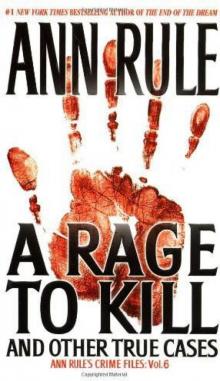 A Rage to Kill: And Other True Cases
A Rage to Kill: And Other True Cases And Never Let Her Go
And Never Let Her Go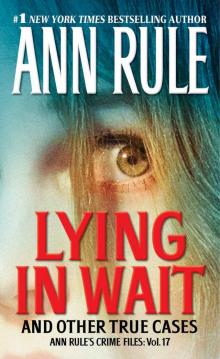 Lying in Wait Ann Rule's Crime Files Vol.17
Lying in Wait Ann Rule's Crime Files Vol.17 Blood Secrets: Chronicles of a Crime Scene Reconstructionist
Blood Secrets: Chronicles of a Crime Scene Reconstructionist No Regrets
No Regrets Mortal Danger
Mortal Danger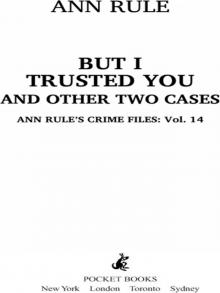 But I Trusted You: Ann Rule's Crime Files #14
But I Trusted You: Ann Rule's Crime Files #14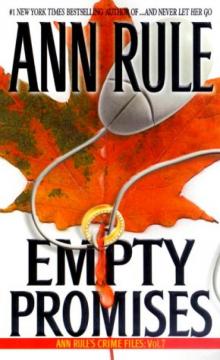 Empty Promises
Empty Promises Dead by Sunset
Dead by Sunset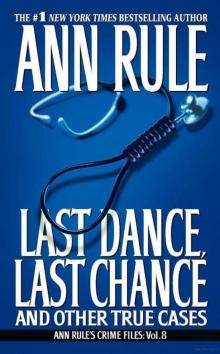 Last Dance, Last Chance
Last Dance, Last Chance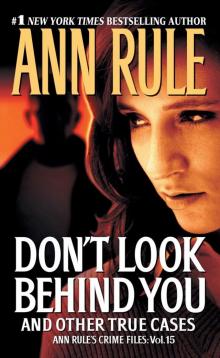 Don't Look Behind You
Don't Look Behind You